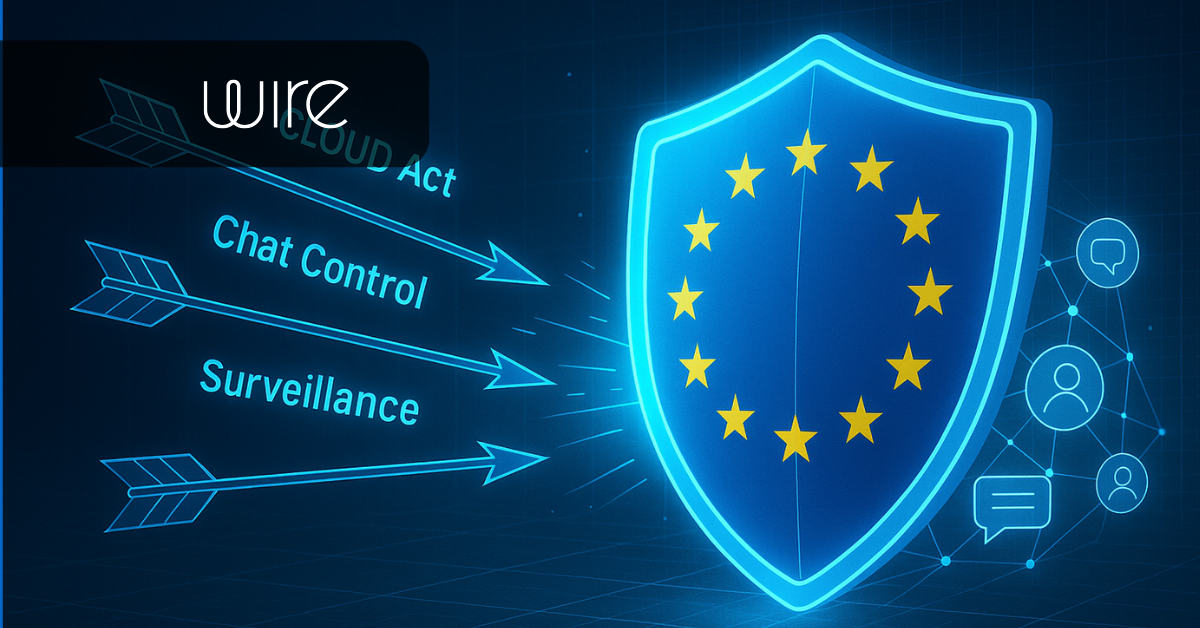As geopolitical tensions rise and cyber threats proliferate, Europe finds itself at a crossroads: cling to the convenience of Big Tech, or reclaim control through digital sovereignty. For privacy-first providers like Tuta and Wire, the choice has long been clear.
While EU policymakers debate sovereignty frameworks, a handful of European tech firms are actively building them. Tuta, an open-source email and calendar provider, and Wire, a secure collaboration platform, have both positioned themselves as viable alternatives to surveillance-driven models that dominate the digital economy.
Why Digital Sovereignty in Europe Is at Risk
In our latest Wire Uncut conversation with Hanna Bozakov, COO at Tuta, we dive into the real meaning of European sovereignty in a digital age dominated by U.S. cloud providers, surveillance-based business models, and proposals like EU chat control that risk weakening encryption for all.
The Illusion of Sovereign Clouds
Many cloud platforms marketed as “sovereign” are anything but. If a provider is based in the U.S., it's subject to American surveillance laws like the CLOUD Act and FISA 702, regardless of where the data is physically stored. As Tuta’s COO Hanna Bozakov put it, “A sovereign cloud from Microsoft is still Microsoft. It’s still subject to U.S. law”Tuta Blog post.
This legal loophole undercuts the EU’s ability to enforce its own data protection rules. Without infrastructure rooted in Europe, the concept of sovereignty risks becoming symbolic rather than structural.
Encryption Backdoors Undermine Everyone
At the heart of this debate lies encryption. European proposals such as “chat control”, which would mandate scanning private messages, have drawn heavy criticism from privacy advocates. Tuta and Wire are among those opposing these efforts, emphasizing that introducing backdoors into encryption systems creates vulnerabilities across the board.
“There’s no such thing as a backdoor just for the good guys,” Bozakov said. “Once it exists, it can be exploited by anyone, hackers, foreign states, or even your own government”. Wire echoes this stance, treating end-to-end encryption as a pillar of secure infrastructure, not a premium feature.
Digital Sovereignty Is Also Economic Sovereignty
Europe’s reliance on non-EU cloud providers is not just a cybersecurity concern, it’s an economic one. Tech monopolies don’t just process data; they monetize it. Their models are built on tracking, profiling, and ad targeting, often at odds with European values like privacy and autonomy.
In contrast, companies like Tuta and Wire have adopted user-centric business models. “We don’t work for advertisers. We work for users,” said Bozakov. This ethical stance has fueled user growth beyond the tech elite, attracting families, healthcare providers, schools, and businesses seeking control over their data.
The Call for Local Alternatives
Despite having the technical talent and tools, Europe often lacks the visibility and political will to prioritize homegrown platforms. Changing this dynamic requires more than regulatory tweaks, it demands structural change in procurement, funding, and infrastructure.
As Bozakov notes:“If we want sovereignty in Europe, we need to choose European services.” This means:
- Adopting open-source, EU-hosted alternatives
- Avoiding long-term vendor lock-in
- Supporting funding and procurement frameworks that prioritize interoperability and data portability
Sovereignty isn’t just policy, it’s procurement, adoption, and infrastructure.
Changing Habits, One Account at a Time
Bozakov acknowledges that switching away from dominant platforms is challenging. Email, for example, is deeply tied to one’s digital identity. But she offers a gradual path forward: open a privacy-first account and migrate over time. “Six months later, your Gmail is mostly spam. Then you know you’re ready”.
This transition is mirrored in corporate environments as well. Wire, which powers secure collaboration for governments and critical infrastructure, has shown that usability and security need not be at odds. Its mission is to prove that secure tools can be intuitive, scalable, and enterprise-ready.
What Sovereignty Really Requires
True digital sovereignty isn’t achieved through slogans or legislation alone. It’s built through local infrastructure, uncompromising encryption, and values-driven procurement. It’s about choosing tools that reflect European ideals of privacy, transparency, and autonomy.
Whether it’s encrypted messaging, secure email, or federated cloud services, Europe doesn’t have to depend on foreign giants. Providers like Tuta and Wire show that alternatives already exist, they just need to be adopted.
Related Resources
